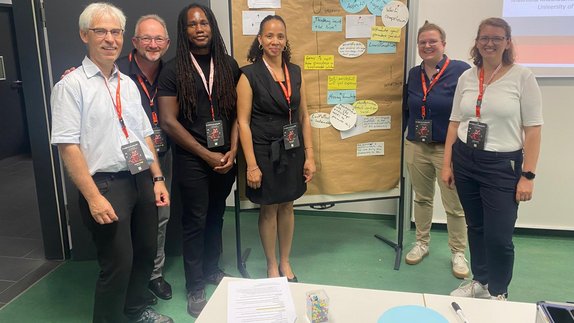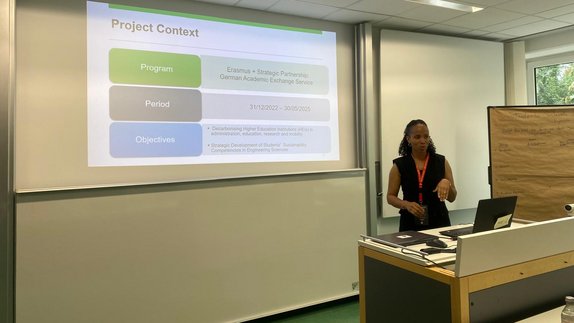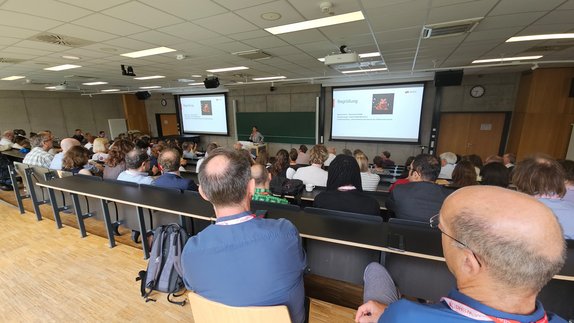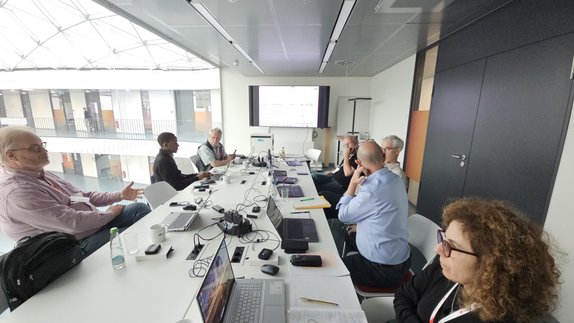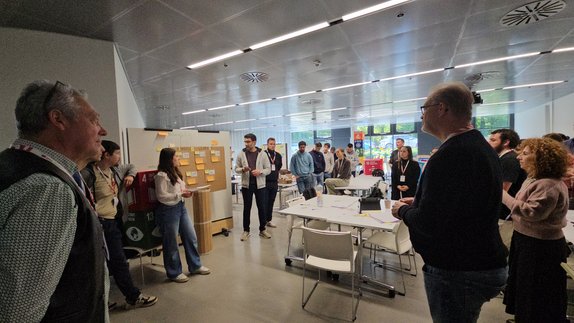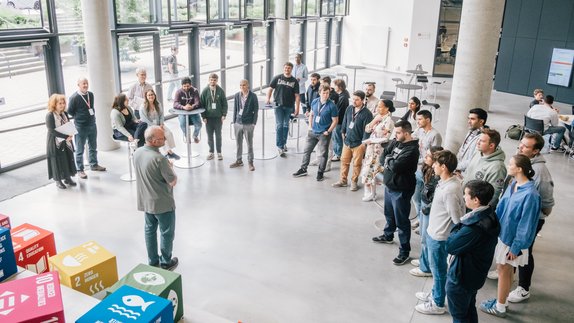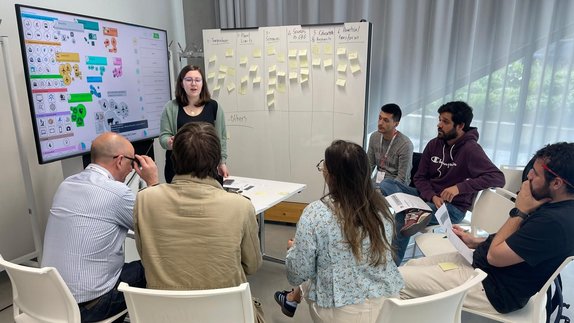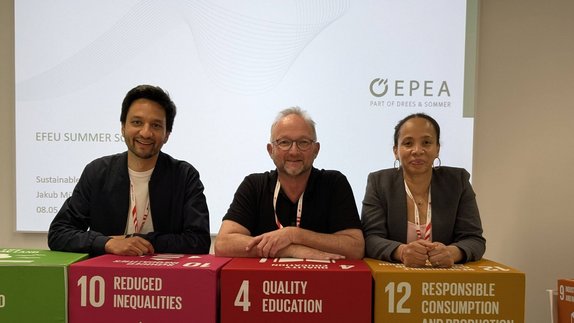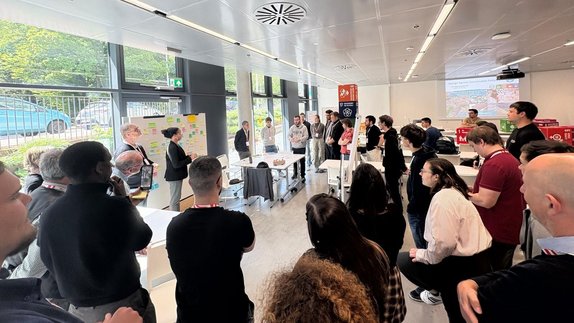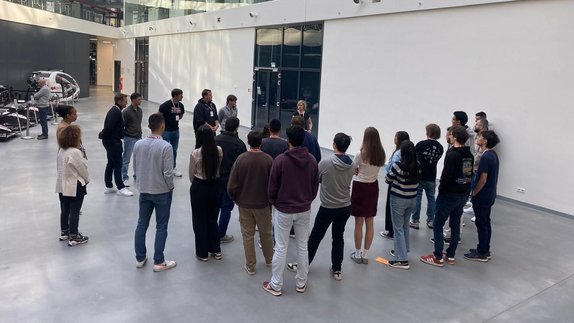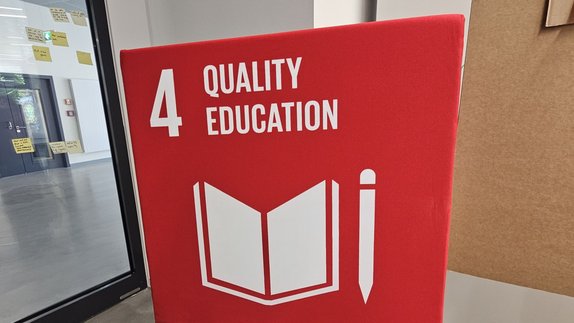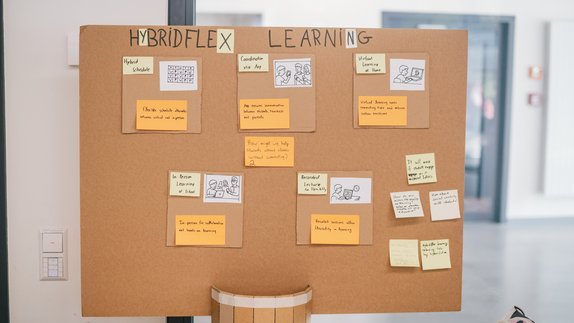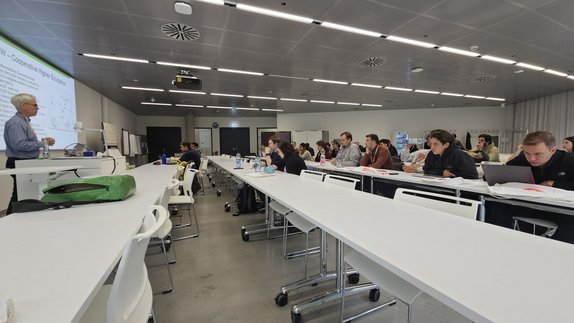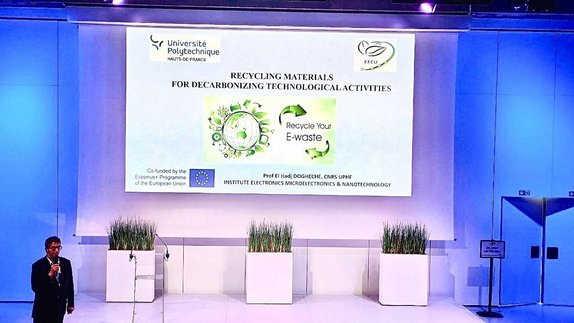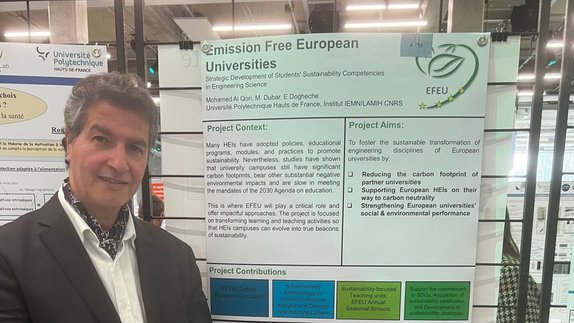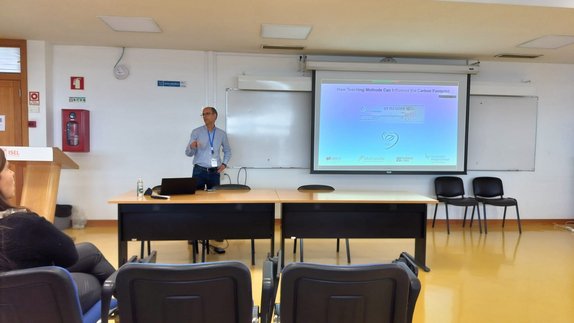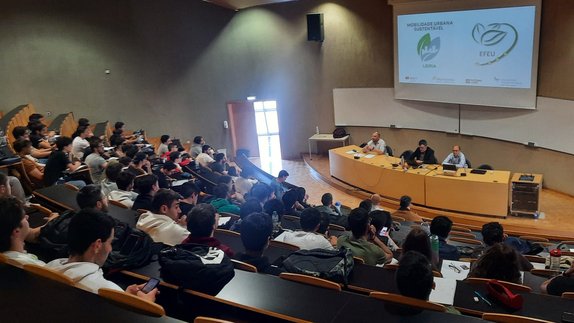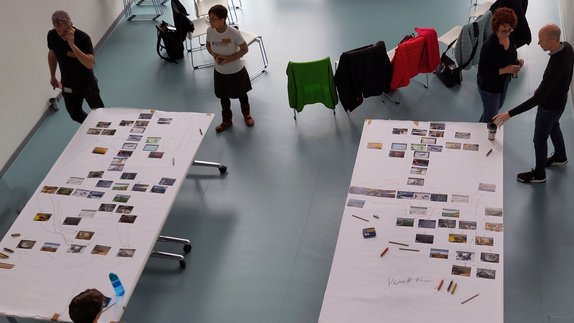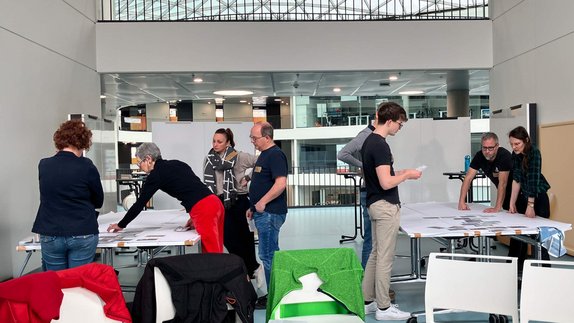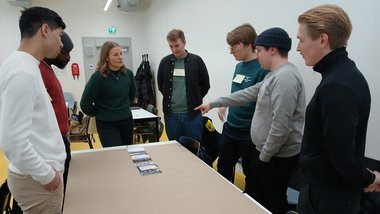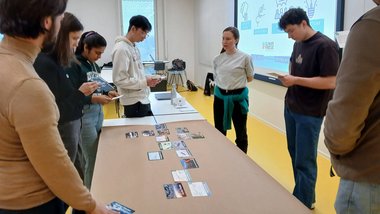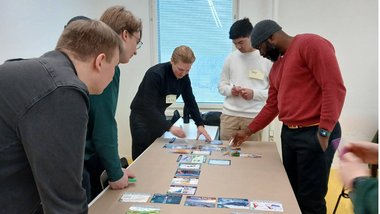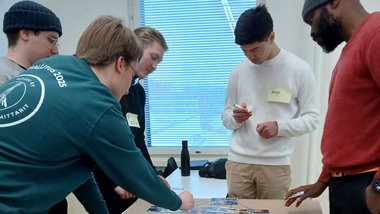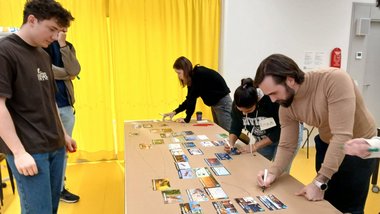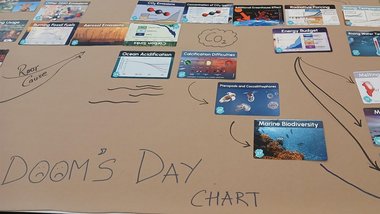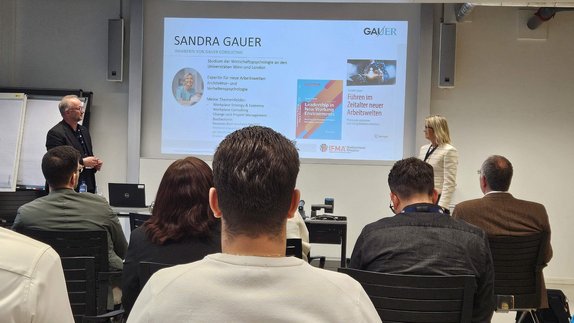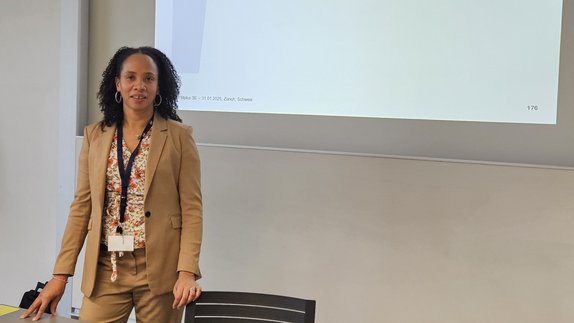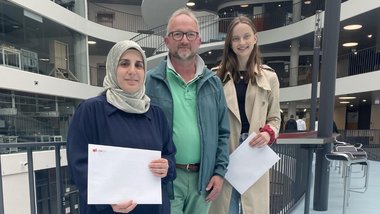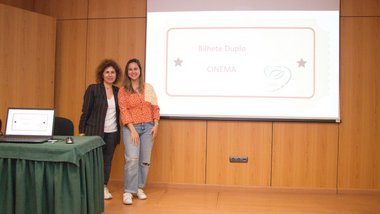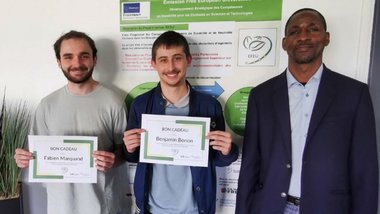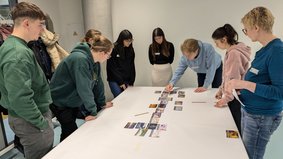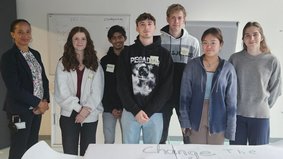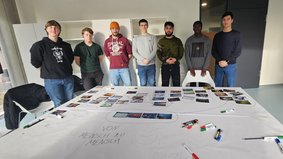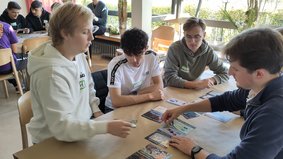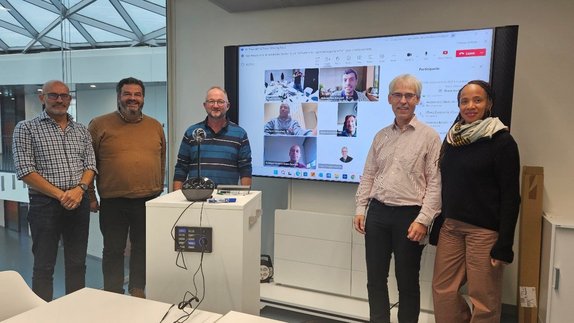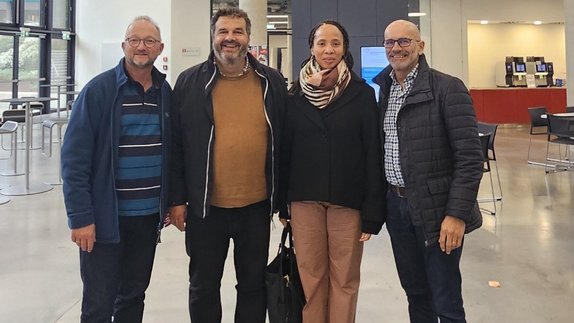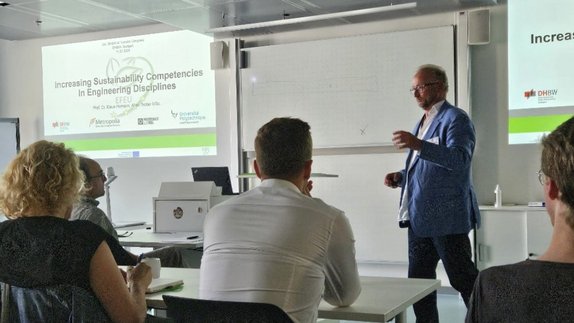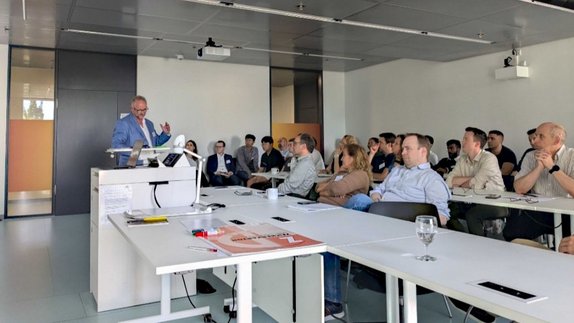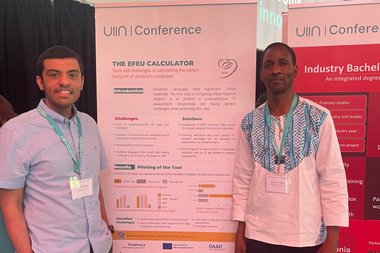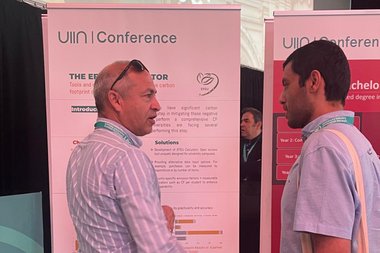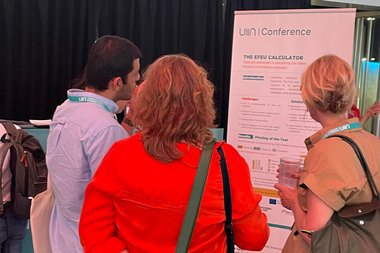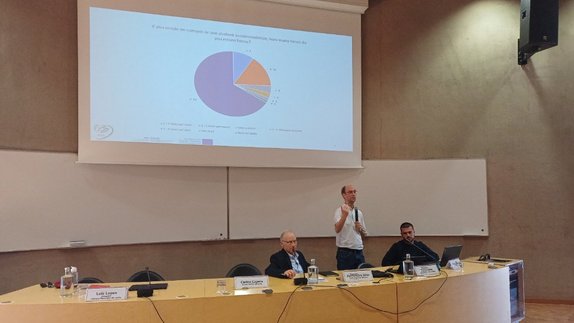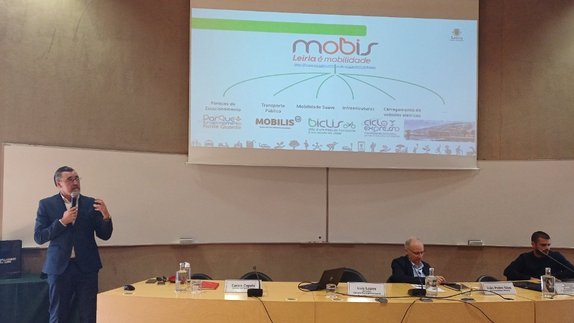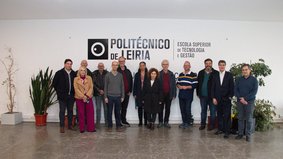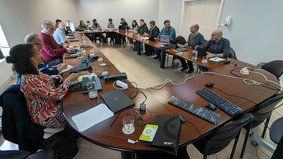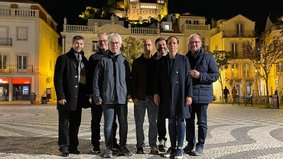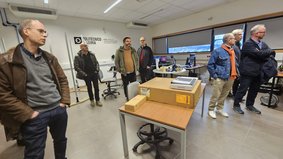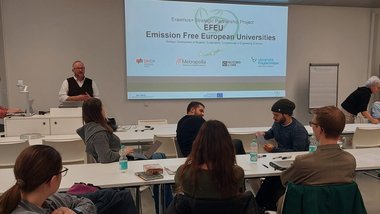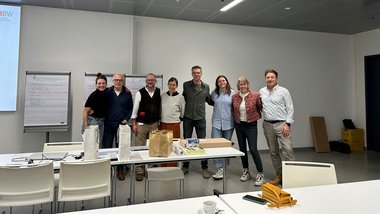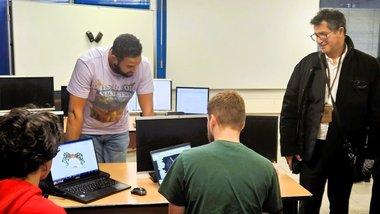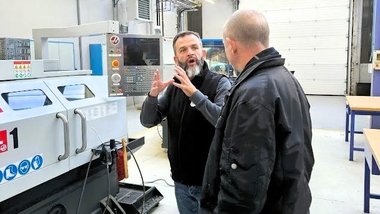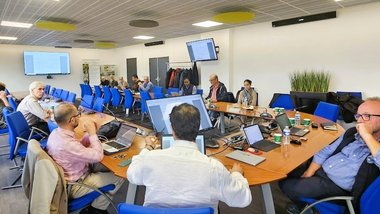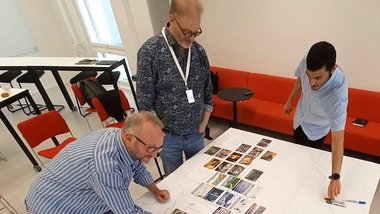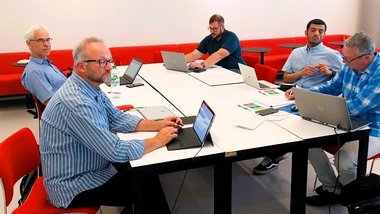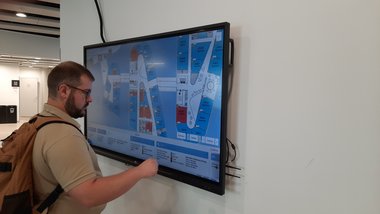EFEU - News
Exciting Insights, Meaningful Impact – DHBW Research Day 2025!
The EFEU coordinating team was proud to participate in the DHBW Research Day 2025 (DHBW Forschungstag 2025) held at DHBW Mannheim on July 2–3. Under the central theme “FIT4Transformation,” the event provided an excellent platform for researchers and DHBW’s dual partners to exchange ideas and network in the areas of research, innovation, and knowledge transfer.
Following the official welcome, Fabian Bülow delivered a keynote titled “Digital Transformation and AI at ABB – Opportunities through Collaboration,” highlighting the value of partnership in driving innovation. His talk was followed by a lively “poster slam,” where researchers presented their work creatively in under two minutes.
Participants were then given the opportunity to attend block sessions during which either workshops and presentations were conducted. The EFEU team hosted a workshop focused on the strategic development of students’ sustainability competencies — the core theme of the EFEU project. After a brief introduction, participants engaged in a co-creation workshop, where they assumed the roles of key stakeholder groups (students, lecturers, administrators, and industry partners) to explore how universities can further advance their sustainability performance and competencies among students. The room was filled with energy, creativity, and genuine commitment.
A quick lunch break led into the afternoon program, which included a compelling keynote by Christine Epler (Head of HR Strategy, Innovations & Diversity, Deutsche Bahn AG) titled “Why We Continue to Focus on Diversity,” along with presentations of additional research projects showcasing innovative solutions across DHBW universities. Overall, the event proved to be an enriching experience, offering meaningful networking opportunities and raising awareness of impactful research initiatives.
EFEU Consortium Advances Sustainable Education Agenda at the Fifth Transnational Project Meeting
Stuttgart, Germany – May 7th and 8th, 2025 – Members of the Emission-Free European Universities (EFEU) consortium gathered for the last transnational project meeting, where strategic discussions and collaborative workshops marked significant progress in the initiative’s core objectives: sustainability in higher education, curriculum innovation, and institutional knowledge-sharing.
🛠️ Co-Creation Workshops
Workshops played a critical role in the meeting as the team worked collaboratively to finalise key components of Work Packages 3, 4, and 5. Outstanding tasks were identified, responsibilities were assigned, and revised deadlines were agreed upon.
🎓 EFEU Summer School 2025 – A Glimpse into the Future
The meeting integrated the inspirational presentations by students from the EFEU Summer School 2025. These presentations showcased innovative solutions to real-world sustainability challenges related to sustainable mobility and infrastructure as well as circular design. EFEU Team members provided students with support and feedback on the proposals. These sessions not only demonstrated student engagement but also affirmed the pedagogical strength of the EFEU project.
🏭 Industry Collaboration in Focus
Participants took part in a field visit to the Mercedes-Benz Museum, gaining insights into the evolution of sustainable technologies in the automotive sector. The excursion underscored the project’s commitment to integrating academic learning with industrial innovation.
🔚 Closing Remarks
The meeting concluded with a renewed sense of direction and collaboration among partners. The discussions and workshops further solidified the EFEU project’s mission to promote a zero-emission mindset through sustainable education, cross-border cooperation, and curriculum transformation.
Stay tuned for more updates as EFEU continues to shape the future of European higher education.
EFEU Summer School 2025: Future Skills for a Sustainable Industry

Location: DHBW Stuttgart
Date: May 5–9, 2025
Participating Institutions: Baden-Wuerttemberg Cooperative State University (DHBW Stuttgart, Germany), Polytechnic of Leiria (Portugal), Metropolia University of Applied Sciences (Finland), and Université Polytechnique Hauts-de-France (France)
The EFEU Summer School 2025 brought together students, educators, and sustainability experts from across Europe for a transformative, week-long journey focused on developing future-ready skills for a sustainable industry. Hosted at DHBW Stuttgart, this hands-on program combined traditional and innovative learning formats, including master classes, problem- and project-based learning methods, workshops, serious games, and collaborative innovation, to address global sustainability challenges.
Day 1 – Launching with Purpose and Passion
The week kicked off with palpable excitement as students from the four partner institutions converged for an immersive opening session. Opening remarks were made by Prof. Klaus Homann, Prof. Christian Götz and Abeo Trotter, member of EFEU coordinating team. Major highlights of the day were a master class on life cycle analysis conducted by Sergio Rossi and key note addresses made by Prof. Margrit Ebinger on the impact of climate change on human health and by Prof. J. Hirschmann on the sustainable evolution of production materials.
The day ended with a tour of the laboratories at the School of Engineering of the DHBW-Stuttgart campus.
Sustainability took center stage from the very beginning, setting the tone for a week filled with cross-cultural collaboration and practical problem-solving.
Day 2 – Design Thinking for a Greener Campus
Led by Jeannine Schwarzkopf, a specialist in agile methodology and design thinking, students explored sustainability challenges facing higher education—the high carbon footprint of mobility activities and the sustainability of campus infrastructure. Working in diverse teams, they applied human-centred design principles to ideate, prototype, and test innovative solutions tailored to the university setting. The outcome? A collection of practical, user-informed ideas ready to shape greener campuses.
Day 3 – From Ideas to Impact
Innovation came alive on Day 3 as student teams pitched their sustainability solutions with impressive clarity and creativity. Presentations featured compelling storytelling, striking 3D visuals, and strategic insights into sustainable mobility and infrastructure. The day ended with an inspiring debrief by Jeannine Schwarzkopf, who infused the room with energy through visionary insights from industry and world leaders and inclusion of inspirational video presentations.
Day 4 – Circular Economy in Action
With Jakub Mües at the helm, Day 4 focused on the Circular Economy—a key driver of sustainable industrial transformation. Students explored how smart design and digital innovation can lead to circular, compliant, and future-forward products. Alternative business models, regulatory frameworks, and emerging technologies were all on the table. The EFEU team, represented by Klaus Homann, Christian Goetz, Dominique Deneux, Hachimi ABBA, Judite Vieira, Paulo Carvahlo, and Jorma Säteri, provided invaluable feedback and sparked meaningful exchanges.
Day 5 – The Final Challenge: Climate Action Gets Personal
The final day of the Summer School started off with the piloting of the EFEU Serious Game, inspired by Ma Terre en 180 Min—a thought-provoking simulation that challenged participants to reimagine climate action on personal, professional, and institutional levels. The experience highlighted the urgency of climate action but also assessed the level of difficulty in making the necessary adjustments.
After some spirited feedback on the game, students turned their attention to reflecting on the overall experience at the Summer School. One participant summed it up best: “This was the highlight of my entire three years as a student.” The day closed with testimonials and deep reflections from participants. Each student selected a Sustainable Development Goal (SDG) that personally resonated with them—a powerful moment that underscored how deeply the week had impacted them. These testimonials will be shared shortly on the project’s website: EFEU Testimonials.
The hand-over of certificates of completion and a celebratory photo session brought this extraordinary week to a memorable close. To every participant, facilitator, and supporter who made the EFEU Summer School 2025 unforgettable: Thank you!
Your commitment and passion turned ideas into action and made the vision of a sustainable future feel possible.
Please feel free to watch the recap video on YouTube.
What We Shared: Dissemination Activities Highlights - April 2025
As part of its ongoing commitment to advancing education for sustainable development and fostering the transformation of local communities, the EFEU team remained highly active throughout April 2025.
On April 1st, Dr. El Hadj Dogheche represented the consortium at the Mardi des Chercheurs (MdC), held at the UPHF campus in Mont Houy. This interdisciplinary research forum facilitates dialogue, idea exchange, and collaboration among researchers, departments, and institutions. Dr. Dogheche presented an overview of key project deliverables, with particular emphasis on the co-created EFEU module "Recycling Materials for the Decarbonisation of Technological Activities." This module focuses on integrating recyclable materials and practices to minimise the carbon footprint of technological equipment. The presentation garnered significant interest and positive feedback from attending industrial stakeholders, underscoring the relevance of EFEU’s work to real-world applications.
In another corner of Europe, EFEU team member Dr. Rui Ruben delivered presentations at two key events. The first, Symcomp 2025, an international conference held in Lisbon, Portugal, brought together academic and scientific communities in the field of numerical and symbolic computation. On April 11th, Dr. Ruben presented findings from the EFEU Mobility Survey conducted across the four partner universities, highlighting correlations between pedagogical approaches and associated carbon footprints.
Dr. Ruben also participated in a mobility workshop with the Leiria City Council on April 29th. The session aimed to disseminate insights from the EFEU Mobility Survey and engage in dialogue on actionable strategies for transforming Leiria’s transportation sector into a more accessible and sustainable system.
These recent activities reflect the EFEU consortium’s continued dedication to addressing sustainability challenges in both the technological and transportation sectors. They also illustrate the strength of its partnerships with local communities, reinforcing a shared commitment to a greener, more sustainable future.
Understanding Climate Change – Developing Solutions – Interactive Climate Fresk Workshop at DHBW Stuttgart
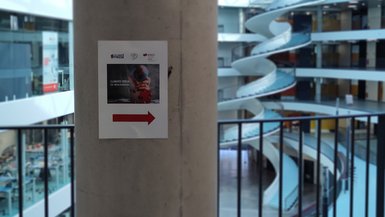
On March 27, 2025, the Center for Interdisciplinary Teaching and Research (INDIS), together with the Emission Free European Universities (EFEU) project, offered an interactive Climate Fresk Workshop for DHBW Stuttgart employees. The goal was to create a better understanding of the causes, interrelationships, and consequences of climate change – and to develop initial steps toward sustainable action.
A central element of the workshop was the so-called "Climate Puzzle," which conveys scientifically sound climate facts in a clear and interactive way. In small groups, participants were able to understand the complex interactions of the climate system in a tangible way and through shared exchange.
The second part of the workshop focused on developing concrete solutions for everyday university life. The discussion demonstrated how diverse and practical sustainable measures can be designed. The workshop made it clear: Understanding is the first step – taking action is the next.
Submission by Mrs. Judit Klein-Wiele, Wissenschaftliche Mitarbeiterin und Zentrumskoordinatorin Zentrum für Interdisziplinäre Lehre und Forschung (INDIS) DHBW-Stuttgart
Another Successful Implementation of Climate Fresk
We are thrilled to share that our project partner, Metropolia University of Applied Sciences (MUAS), successfully hosted a Climate Fresk Workshop in February 2025 at the Myllypuro Campus!
This interactive and thought-provoking workshop empowered participants to deepen their understanding of climate change and its interconnected challenges. Participants moved beyond awareness, shifting their focus toward practical, solutions-driven approaches to reduce emissions and drive positive change. Through engaging discussions and collaborative activities, they examined the environmental impact of these approaches, assessing them based on efficiency, feasibility, and difficulty.
A huge thank you to Jorma Säteri and Riina Strengell for their dedication to advancing climate change education and inspiring MUAS students to take meaningful action.
Brief - EFEU SAX and EFEU CFC featured at the First Spotlight FMplus Conference
The Spotlight FMplus Conference was officially launched in January 2025 by the Institute for Facility Management of Zürcher Hochschule für Angewandte Wissenschaften (ZHAW), International Facility Management Association (IFMASwitzerland), and German Facility Management Association (GEFMA). It aims to address key issues in facility management and real estate across the DACH region, fostering exchange between academia and practice. It serves as a platform to:
- Identify industry challenges and opportunities
- Share scientific and practical insights
- Recognise outstanding research in facility management (FM) and related fields
- Broaden public access to key findings
The first day – January 30, 2025 - was dedicated to facility management in professional practice and the second day - January 31, 2025 - placed a spotlight on innovative research projects. Speakers and presenters represented diverse fields including industry experts, professors, and researchers from the fields of sustainability (climate, energy, and circular economy), digitalisation, collaborationand building culture, education and society, services and hospitality, as well as working environments.
Our very own Abeo Trotter presented the newly developed "EFEU Sustainability Awareness Index (EFEU SAX)" and the "EFEU Carbon Footprint Calculator (EFEU CFC)." These tools are part of the promised deliverables under the Emission Free European Universities project with the intention of furthering the sustainability competencies and environmental performance of institutions of higher education.
The conference, attended by approximately 250 participants, provided valuable insights into the evolving landscape of Facility Management, fostering collaboration and knowledge sharing among professionals dedicated to advancing the field. The event underscored the importance of innovation, resilience, and sustainability as key drivers of future FM success.
- An abstract featuring the EFEU Sustainability Awareness Index forms part of the conference proceedings, and is available via this link: Development of Sustainability Awareness Index for European Universities (PDF)
- The delivered presentation is accessible via this link: Presentation - Development of a Sustainability Awareness Index for European Universities (PDF)
Interested parties can access the tool by emailing abeo.trotter@dhbw-stuttgart.de.
To Inform, Mobilise, And Take Action Against Climate Change
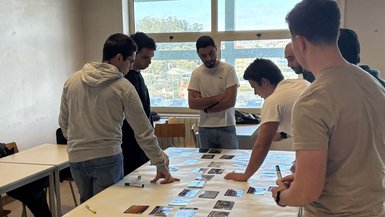
Climate Fresk Implementation at the School of Technology and Management - Polytechnic Institute of Leiria
As part of the Emission Free European Universities (EFEU) project, the School of Technology and Management of the Polytechnic Institute of Leiria hosted the first of two sessions of the Climate Fresk Workshop on December 13 and 18 with students of the Mechanical Department. A total of 21 students from engineering courses participated in the sessions.
This workshop centred on a game of 42 cards that illustrate cause-and-effect relationships, aims to foster a deeper understanding of climate dynamics. It is a scientific game based on reports produced by the United Nations Intergovernmental Panel on Climate Change (IPCC). This educational tool simplifies the intricate dynamics of climate change into an engaging and collaborative experience.
The participants were impressed by the playful approach to raising awareness. They also appreciated the insightful discussions focused on the relationship between contemporary events such as water scarcity, deforestation, desertification, ecosystem changes, biodiversity loss, human health and well-being and the climate change phenomenon.
This initiative underscores the institution’s commitment to educating, raising awareness, and encouraging students to adopt new behaviours and practices. Participants are now part of the growing global movement, which so far has involved over 1.3 million people worldwide in confronting climate challenges and recognising the urgency of both individual and collective actions. It is hoped that the experience has transformed students into active and passionate agents of change.
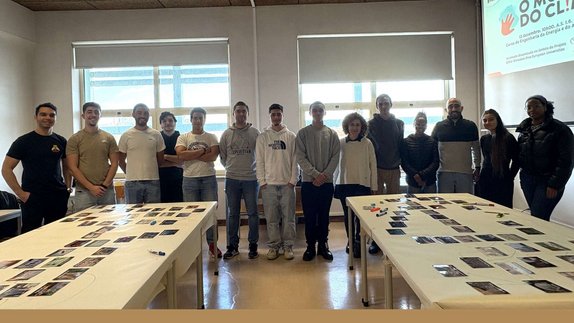
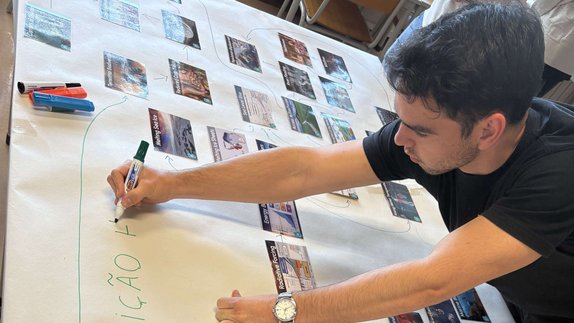
Celebrating the winners of the EFEU Survey Raffle
The EFEU team is thrilled to announce the winners of the recent EFEU Survey Raffle, held across our four esteemed partner universities during the first quarter of 2024. This initiative was aimed at encouraging participation in the EFEU survey. The survey gathered invaluable insights on the status of sustainability education and practices as well as mobility practices within the four institutions. We extend our heartfelt gratitude to all participants for sharing their valuable feedback and contributing to the success of this initiative.
The Winners
Following a fair and transparent selection process, winners were announced at various times throughout the year at the campuses of the partner universities. The winners are listed below.
1. Baden-Württemberg Cooperative State University (DHBW Stuttgart)
- Busra Domac
- Saskia Herold
- Max Fleischer
2.Polytechnic Institute of Leiria (IPL)
- Larissa Togeiro
3. Metropolia University of Applied Sciences
- Ibrahim Aweys
- Terhi Hannuksela
4. Polytechnic University of Hauts-de-France (UPHF)
- Fabien Marquand
- Benjamin Bonon
Recognising Participation and Engagement
The EFEU Survey underscores the importance of student and faculty voices in shaping sustainability initiatives. The feedback will play a pivotal role in facilitating initiatives that address contemporary and future sustainability competencies within higher education and beyond. Insights collected from the survey will specifically help identify opportunities to integrate sustainability into curricula, research, and campus operations.
We congratulate the winners and thank everyone who participated in this exciting initiative.
Stay connected with the EFEU community for more updates, initiatives, and opportunities to engage!
Shaping Climate Consciousness: EFEU’s Second Installation of Climate Fresk at DHBW Stuttgart
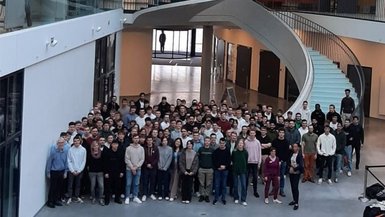
We are delighted to announce the successful conclusion of the EFEU’s second Climate Fresk installation! This impactful event unfolded during the last quarter of 2024 with incoming students of the DHBW Stuttgart campus. On the 28th and 29th of October, the 29th of November, and the 3rd and 4th of December, students and staff from the Embedded Systems, Electrical Engineering, and Facility Management Departments participated in the serious game, Climate Fresk.
Climate Fresk, developed by French Scientist Cedric Ringenbach, is an engaging and educational game that explores the causes and consequences of climate change, highlighting its complex interconnections.
A heartfelt thank you to the following individuals for supporting and participating in this initiative: Kristina Hönes, Gise Ruprecht, Idriss Brockmann-Serbis, Ilona Diéval-Lozac'h, Jeannine Schwarzkopf, Olivier Schecker, Prof. Dr.-Ing. Jens H. Bossmann, Christian Goetz, Klaus Homann, Abeo Trotter, Baden-Wuerttemberg Cooperative State University-Stuttgart, and Climate Fresk Deutschland.
The sessions were brimming with insightful discussions and inspiring ideas, showcasing the creativity and engagement of our students. Together, we have taken a meaningful step towards greater awareness and action for our planet.
The Manufacturing Center of Germany and Climate Neutral Universities
Stuttgart Hosts the 4th Transnational Meeting of the EFEU Consortium
Stuttgart, often referred to as the cradle of the automobile industry and home to major corporations such as Porsche, Bosch, and Mercedes-Benz Group, was the designated host for the 4th Transnational Project Meeting of the Emission-Free European Universities (EFEU) Consortium. This two-day event, which took place on October 23rd and 24th, 2024, brought together project members both in person and virtually to advance key objectives.
Objectives of the Meeting
The meeting aimed to achieve three primary objectives:
- Addressing Project Management Issues
Participants focused on critical project management issues, particularly the status of dissemination activities, and the review of recommendations derived from the two reports produced under Work Package 2. - Fostering Collaborative Work
Efforts focused on the planning and executive of tasks related to the various work packages, setting deadlines, and assigning responsibilities to ensure the successful delivery of project outcomes. - Building Team Cohesion
A significant objective was to strengthen team dynamics through in-person and virtual engagement, encouraging collaboration despite the diverse locations of team members.
Participation and Sustainability Practices
While many members attended virtually due to other professional commitments, the hybrid format also ensured inclusivity and upheld the project’s commitment to greener practices.
Planning for Long-Term Impact
One of the meeting’s highlights was the discussion on ensuring the long-term impact of the project deliverables. To this end, a conference is planned for the first quarter of 2025. The event will target key administrative stakeholders, including green office representatives, deans, directors of engineering programs, campus presidents, and national and regional university networks.
This conference will focus on integrating EFEU project results into institutional sustainability initiatives and promoting best practices across universities. By engaging leaders at the administrative level, the project aims to embed its deliverables into long-term strategies for sustainability.
The 4th Transnational Meeting of the EFEU Consortium in Stuttgart marked a pivotal step in advancing the project's objectives. By addressing critical project management topics, fostering collaboration, and planning for long-term impact, the meeting reinforced the consortium's commitment to sustainable education.
International Relations Office of UPHF Embraces Climate Awareness
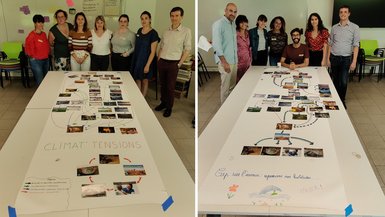
We are proud to share that the entire International Relations Office of the Université Polytechnique Hauts de France, one of the partner universities of the EFEU Team, has completed training through the "Fresque du Climat" workshop! The event took place on July 10th 2024. This transformative experience has heightened our awareness of climate change and provided us with actionable strategies to make a difference. We now all understand that small actions can have a significant impact on our planet.
Thank you to all who actively participated in the discussions. This is just the beginning – help us spread the message and encourage positive change. Take the first step by measuring your carbon footprint and discovering how you can reduce CO2 emissions in your daily life! Knowledge and small actions can have a significant impact on our planet!
Martha Drelon, UPHF's International Relations Office
EFEU and AI Transfer Congress - 2024
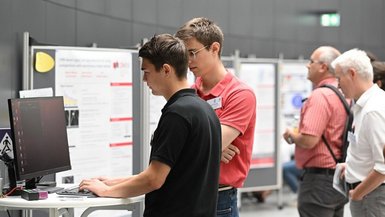
Artificial intelligence (AI) has the potential to significantly contribute to the sustainable development goals. However, AI comes with its share of challenges and concerns, including the risk of bias in AI algorithms and the unsustainable nature of digital technologies. To fully capitalise on benefits offered by AI and other technologies, societal actors must focus on both advancing training and technology adoption as well as ensuring the responsible and ethical use of these technologies. The AI Transfer Congress is, therefore, taking place at a relevant time. It provides the ‘opportunity for ongoing exchange between researchers and practitioners in order to discover new ideas and build cooperation to advance the use of Artificial Intelligence in all aspects of society and the economy.’1
This year, the 3rd AI Transfer Congress took place at the DHBW-Stuttgart campus. On July 11th, 2024, representatives from the fields of science, industry, and society came together to explore and discuss the latest advancements and applications in artificial intelligence. The congress features conferences, workshops, and poster displays. The conference sessions ‘focused on current research in AI, with a special focus on applications. The workshop sessions featured use cases, success stories of AI in industry, and discussions of responsible AI.’2 The poster displays highlighted ongoing and completed projects incorporating AI and digital tools.
One of these workshops was Digitainability - Future skills in a world shaped by AI and sustainability. It was hosted by Klaus Homann, project coordinator of the EFEU - Emission Free European Universities, and Emily Rauch, a researcher at the DHBW Karlsruhe and member of the Next-Education. Digitainability - a fusion of the terms "digitalisation" and "sustainability", aims to apply the positive aspects while mitigating the negative aspects of digitalisation in significantly increasing progress towards achieving the Sustainable Development Goals (SDGs).
Klaus Homann focused on the topic of sustainability competencies by presenting the findings of the EFEU's Sustainability Awareness Survey. As part of its planned outcomes, the EFEU project will enhance future skills by implementing strategic measures to develop sustainability competencies for engineering students.
Emily Rauch focused on AI competencies by presenting an overview of an Empirical Study on the Future Skills of Adult Professionals in Baden-Württemberg. This study forms part of the AI Campus project, which is led by the NextEducation research group. This group is focused on the digital transformation of learning and educational institutions within Baden-Württemberg.
After the presentations, participants were divided into working groups with two objectives in mind. Firstly, the groups discussed how AI could be applied to address sustainable development goals (SDGs). Secondly, discussions centred on how required AI approaches and sustainability competency frameworks could be integrated into teaching activities.
This year’s event was a successful and enlightening experience that brought together a diverse number of professionals in the field. It provided a glimpse into the exciting applications of AI and other technological developments, brought into focus the experiences, sustainability, and social concerns related to the use of these applications, and highlighted the emergent skills required for AI, digitalisation and sustainability nexus.
Special thanks to Ulf-Daniel Ehlers and Emily Rauch of the Next Education Team for their support and collaboration.
- 1Duale Hochschule Baden-Württemberg (2024). AITC 2024: Vielfältige Workshops und intensives Networking. Accessed on July 20th, 2024
- 2 Duale Hochschule Baden-Württemberg-Karlsruhe (2024). DHBW AI Transfer Congress. Accessed on July 20th, 2024
EFEU and IPW 2024
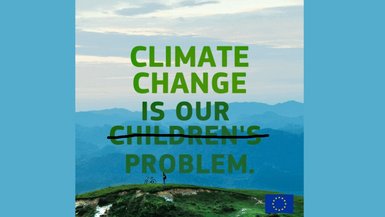
Mosbach, a town in northern Baden-Württemberg, was the location of the 18th Annual Engineering Education Conference (IPW). The conference took place from June 13th to 15th, 2024, under the theme “Interplay of Theory and Practice in Teaching: Paths to Technical Education.”
On June 14, 2024, the umbrella organisation 4ING of the Faculty Days of Engineering and Computer Science held a session on securing young talent, focusing on how to attract and retain foreign students and integrate them into the German job market. During this session, Prof. Dr Klaus Homann, project coordinator of the EFEU team, presented on 'Climate Fresk: The Application of Gamification to Stimulate Sustainability in Engineering Disciplines.' Dr Homann's presentation highlighted the experience of using Climate Fresk, a serious game, as a learning activity for first-year engineering students at DHBW Stuttgart.
'Climate Fresk' is a card game developed by a French NGO and its founder, Cédric Ringenbach. The game, lasting 3 hours, has been implemented in over 40 countries and has approximately 1 million participants. During the game, participants used 42 cards to form large-format puzzles that illustrate the cause and effect of climate change. During the seminar in Stuttgart, first-year students were supported by four Climate Fresk coaches: Abeo Trotter from DHBW-Stuttgart, and Hachimi Abba, Dominique Deneux, and Abdelmalik Taleb-Ahmed from Université Polytechnique Hauts-de-France.
An impact study was conducted before and after the session, and the results formed the basis of Dr. Homann's presentation. The findings were well received by attendees, who expressed their intentions to implement the game at their respective universities. Notable feedback included comments such as 'Your presentation really triggered me' and ‘Exciting – definitely something we have to implement as well.’
EFEU AND SAGIP 2024
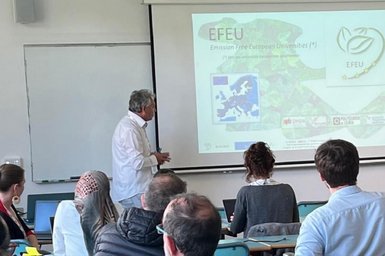
The 2nd Congress of the Society of Automation, Industrial Engineering, and Products (France) was hosted by INSA-Lyon in Villeurbanne, France, from May 29 to 31, 2024.
EFEU representative Prof. Dominique Deneux presented the EFEU project during the afternoon session on May 30 to the 'SUSTAINABILITY' Technical Committee. The newly minted EFEU Carbon Footprint Calculator (CFC) and the results of its application by the four EFEU project partners were presented to 70 congress participants.
The presentation was well-received, and the follow-up discussion was thought-provoking and motivational.
EFEU and UIIN (University Industry Innovation Network) - 2024
Each year, the University Industry Innovation Network (UIIN) hosts a global conference that brings together leading minds from academia, industry, and government to foster transformative discussions, address global challenges, and drive impactful change. The 12th UIIN conference, held in Madrid from May 27 to 29, 2024, focused on the theme 'Shaping the Future of Talent and Innovation.' The event attracted over 400 participants and 200 organisations across more than 40 countries.
The EFEU team was represented by Mehran Attar from Metropolia University of Applied Sciences and Hachimi Abba from the Polytechnic University of Hauts-de-France. They presented on the EFEU Carbon Footprint Calculator (EFEU CFC), a tool specifically designed to help universities achieve carbon neutrality. The presentation showcased the tool's successful pilot implementation by EFEU team partners, highlighted the challenges encountered, and proposed solutions for overcoming these obstacles. This experience provided inspiration and valuable networking opportunities for all participants.
EFEU and Leiria City Council
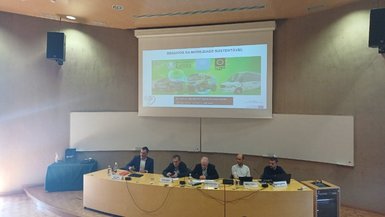
One of the primary goals of the EFEU project is to ensure its outputs contribute to the sustainable development of communities. This was the exact purpose of the planned mobility workshop with the Leiria City Council. On May 8, 2024, several speakers, including Luís Lopes of Leiria City Council, Hugo Antunes of PRF – Gás, Tecnologia e Construção, and Prof. Dr. Rui B. Ruben of the EFEU team and the Polytechnic Institute of Leiria (IPL), came together to discuss how to best address the mobility challenges facing the city of Leiria.
The city is spread over a large area in small population clusters, presenting a unique challenge in implementing sustainable mobility. Mr. Lopes presented possible strategies to overcome these challenges. Mr. Antunes, responsible for hydrogen refuelling in Dakar, shared insights on green mobility, drawing from his experience with hydrogen usage in motorsports. Dr. Ruben presented the results of the EFEU Mobility Survey, which examined the mobility habits of IPL students and staff. He used this opportunity to propose strategies to promote sustainable mobility behaviour within the university community and emphasised the support needed from the city council.
This one-day event showcased ongoing efforts toward the sustainable transformation of both the university and the city. It also underscored the importance of collaboration between higher education institutions and government entities in addressing societal challenges. The EFEU team looks forward to future opportunities to support community initiatives.
Medieval castles and sustainable universities
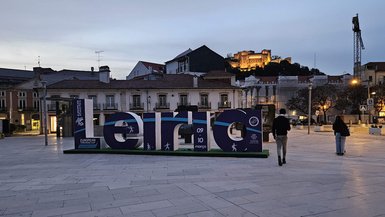
3rd transnational project meeting (TPM) – Leiria, Portugal
The Leiria Castle stands majestically atop a hill, offering a picturesque view of Leiria. Situated between Porto and Lisbon, Leiria is renowned for its charm and medieval ambience. It was chosen as the venue for the 3rd Transnational Project Meeting. This two-day event unfolded at the campus of Politécnico de Leiria (IPL).
OBJECTIVES OF THE MEETING
The objectives outlined for this meeting were similar to the previously held TPM and therefore included:
- Addressing pertinent matters related to project management.
- Facilitating interactive co-creation workshops on topics relevant to the project’s work packages.
- Determining optimal approaches for executing the outlined activities within the work packages.
- Orchestrating activities aimed at fostering team cohesion and synergy.
- Observing measurable sustainability initiatives implemented by a university campus.
PARTICIPANTS/GUEST SPEAKERS
Participants joined the event through two avenues: in-person attendance and virtual participation via MS Teams. The project welcomed the following attendees:
- DHBW: Klaus Homann, Christian Götz, Abeo Trotter
- IPL: Luis Coelho, Rui Ruben, Judite Vieira, Paulo Carvalho, Marcelo Gaspar
- Metropolia: Jorma Säteri
- UPHF: El Hadj Dogheche, Dominique Deneux, Hachimi Abba, Abdelmalik Taleb-Ahmed
Several distinguished guest speakers enriched the event with their expertise and insights. They represented various institutions and industries:
- Yuqiang Gu - DHBW Stuttgart
- Ana Pires - CENTIMFE
- Joana Frazão - Fravizel
- Carlos Viegas - Leerdam Crisal Glass
- Isabel Lança - Ordem dos Engenheiros
Highlights
The event commenced with welcoming remarks delivered by esteemed figures: Rui Ruben, the Project Leader of the IPL Team; Maria Leopoldina Alves, Department Coordinator of the Mechanical Department at IPL; and Pedro Assunção, Vice-President of IPL.
Subsequently, presentations and discussions were held, which revolved around ongoing activities encompassing the five work packages within the EFEU project.
Discussions centred on crucial aspects of project management, including the Beneficiary Model, Project Tracker 2.0, Budget Management, Dissemination Activities, and Project Impact and Indicators.
The DHBW Team presented an overview of the findings from the EFEU Sustainability Awareness and Mobility Survey, which prompted discussions on the survey's objectives. These were outlined as providing support for sustainability efforts at each partner university and developing a collective sustainability awareness index. Subsequently, two working groups were formed to aid in the analysis of the survey results.
A revised version of the EFEU CFC Report will be presented at a later date. The targeted completion date is 31/03/2024, aligning with the intention to present the results at the UIIN conference.
The UPHF Team presented an updated iteration of the EFEU Curriculum Analysis Tool, with suggestions made by the other team members to optimise the format and outcomes.
The IPL Team presented the methodology and findings of their campus's curriculum analysis, offering insights gleaned from the exercise. Additionally, they proposed potential adjustments aimed at enhancing the results.
The UPHF Team introduced a revised version of the proposed BIP. Recommendations were provided to enhance its implementation, including adopting a project-based methodology, modifying the time frame and establishing the number of allocated ECTS.
Yuqiang Gu from DHBW Stuttgart delivered an online presentation regarding the ongoing project “Databrix” (www.databrix.org). Databrix is a collaborative e-learning platform addressing data science and machine learning projects. The highlighted project involves visualising CO2 concentrations in the world's oceans and was proposed as a possible project that could be transferred to the project partners.
The IPL team outlined the initial steps for Work Package 4, which included preparing the mobility survey results and creating a web platform to showcase the carbon footprint of learning activities among partners.
Furthermore, team members highlighted the importance of leveraging results from Work Package 4 to transform the community's commuting behaviours. This includes developing a process, pilot program, or roadmap to decrease the carbon footprint of campuses, faculties, and the community. Moreover, workshops should be considered to expand sustainable mobility practices to other campuses.
- Ana Pires, a representative from CENTIMFE, presented on "Research & Technology Organisations (RTOs) as Catalysts for Carbon Neutrality and Social Responsibility.” The highlight of the presentation was the ensuing discussion, which addressed approaches to diagnosing educational needs, supporting digital transition, and developing and strengthening sustainability skills. Additionally, the company advertised a self-diagnostic tool that students of partner universities can use to assess their sustainability proficiency levels.
- Joana Frazão, the Human Resource Manager from Fravizel, delivered a presentation titled "Fravizel: Sustainability Proposal." During the presentation, the Fravizel representative delved into the essential skills anticipated by employees, the incorporation of serious games to bolster sustainable education, and the sustainable evolution of the quarry industry.
- Carlos Viegas, Leerdam Crisal Glass, presented the following: " Decarbonization of the Glass Industry: A challenge that cuts across different areas of Engineering.” The executive discussed the decarbonisation process within the glass industry, the relevance of critical partnerships in addressing complexities, and the significant competencies and attributes of engineers employed in the glass industry.
- Isabel Lança from Ordem dos Engenheiros presented the following topic: “Engineering and Sustainability.’’The environmental engineer laboured on the following theme: the critical role of engineering in sustainable development. She discussed the role of skills and partnerships in ensuring engineers are adapted to the goals and priorities set out by the SDGs and future employment demands.
SHARING OF BEST PRACTICES: SUSTAINABLE CAMPUS
A tour was done of the Center for Rapid and Sustainable Product Development (CDRSP) to demonstrate:
- the contributions and involvement of students in innovative and sustainable projects and
- sustainability initiatives focused on recycling and upcycling of various source materials.
THE WAY FORWARD
The project partners confirmed the date of the forthcoming project meeting.
Action items were delineated for project members to bolster the advancement of planned project activities.
We heartily appreciate the IPL team for their outstanding efforts in hosting the EFEU team and ensuring the success of the third transnational project meeting.
EFEU and Tuesday of Researchers
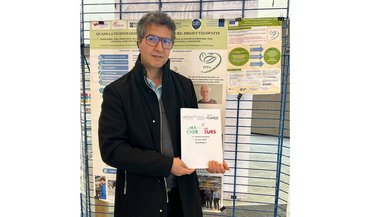
On March 26th, 2024, Prof. Dr. El Hadj Dogheche from the EFEU Team at UPHF (Université Polytechnique Hauts-de-France) participated in the twelfth edition of Mardi des Chercheurs (MDC) – Tuesday of Researchers – held in Mons, Belgium. This event, initiated by the Polytechnic Faculty of Mons in the early 2000s, serves as a platform created by researchers for researchers. Its objectives include introducing colleagues from diverse faculties to ongoing research within the university, fostering interdisciplinary collaboration among researchers, and informing Master’s students about available funding opportunities.
During the event, Prof. Dr. Dogheche showcased the EFEU project alongside the UPHF students' initiative. The interim results of the EFEU project, such as the development of the EFEU carbon footprint calculator and the EFEU Sustainability Awareness and Mobility Survey, as well as the outcomes of the EFEU Curriculum Analysis, were presented to the attendees. The participants were also introduced to the student’s project entitled Vélopattes as Foot-cycle, which highlighted an inclusive and sustainable approach to design, fabrication, and prototyping. Prof. Dr. Dogheche had the opportunity to address an audience of over 250 participants, including research assistants, doctoral students, and professionals in various scientific fields.
Attendees found the details of the EFEU project and the Vélopattes as Foot-cycle stimulating and expressed a keen interest in learning about the future development of both projects.
EFEU meets EuroFM Deep COIL 2023 @DHBW Stuttgart
On December 15th, 2023, EFEU met EuroFM´s Deep COIL 2023 during the “Live Final” at DHBW-Stuttgart. The EuroFM Deep COIL 2023 was dedicated to EU´s ESG regulations and the question, of how Facility Management can support the successful sustainable transformation of organizations.
Klaus Homann presented the EFEU project to 34 students and 9 academics from Hanzehogeschool Groningen, Zuyd Hogeschool, Hogeschool Inholland Amsterdam, The Hague University of Applied Sciences and ZHAW Zurich University of Applied Sciences.
Both projects share strong common interests and agreed that the opportunities for future cooperation should be explored.
‘Athens of the North’ and Emission-Free Universities
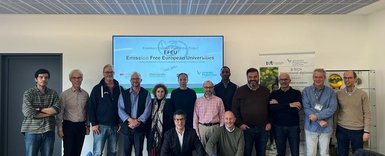
2nd Transnational Project Meeting (TPM) – Valenciennes, France
Valenciennes, sometimes referred to as the ‘Athens of the North’, was the location of the 2nd Transnational Project Meeting. The 2-day meeting took place at the Université Polytechnique Hauts de France Campus at Mont Houy, Valenciennes.
Objectives of the meeting
The objectives outlined for this meeting were:
- addressing matters related to project management,
- facilitating discussions and conducting presentations on topics relating to the project’s work packages,
- determining the best approaches in undertaking the outlined activities of the work packages,
- facilitating team building, and
- observing measurable sustainability actions implemented by a university campus.
Participants/Guest Speakers
Participation was possible both in-person and virtually via MS Teams. The project members in attendance were: Klaus Homann, Christian Götz, Abeo Trotter (DHBW); Luis Coehlo, Rui Ruben, Judite Vieira, Paulo Carvalho, Marcelo Gaspar (IPL); Jorma Säteri, Mehran Attar (Metropolia); and El Hadj Dogheche, Dominique Deneux, Hachimi Abba, Abdelmalik Taleb-Ahmed (UPHF)
There were notable guest speakers such as Guillaume Dumont and Olivier Senechal from Institut National des Sciences Appliquées de Hauts-de-France (INSA HdF), Loic Lezzani from the Mechanical Department of the Institut Universitaire de Technologie (IUT), Jean Luc Franquelin from the Renault Group and Bertrand Brider from the Unit for Sustainable Development & Social Responsibility at UPHF.
Highlights
Welcoming remarks were made by Isabelle Massa, director of the Institut Universitaire de Technologie - Valenciennes (IUT) and Klaus Homann (DHBW).
Presentations and discussions were held on the work plan, details and on-going activities of the five work packages forming part of the EFEU project.
Work package 1: Project Management
Matters related to communication management, project monitoring, and budget management were discussed and outstanding issues were documented.
Work package 2: State-of-the-Art Analysis: Universities on their way to emission neutrality
Discussions were centred on two activities: the development of the EFEU Carbon Footprint Calculator (CFC) and the Sustainability Awareness/Mobility Survey.
EFEU CFC:
- Mehran Attar (Metropolia) presented the latest version of the EFEU Carbon Footprint Calculator.
- The deadlines were finalised for submitting the preliminary and final reports.
- Each partner gave a summary of their first experiences with data collection.
Sustainability Awareness/Mobility Survey_
- Abeo Trotter (DHBW) presented the latest version of the survey. The survey was improved by addressing and amending the problematic questions.
Work package 3: Curriculum and Module Development: From Teaching and Learning to Emission Neutrality
There were several insightful and inspiring presentations, which are summarised below.
- Dominique Deneux (UPHF) touched on the topic: ‘Curriculum Analysis and Module Development’ by presenting options and resources to be considered for the EFEU Curriculum Analysis Tool and EFEU module.
- Guillaume Dumont (INSA HdF) gave a presentation on the topic: ‘Training an Engineer for the 21st century.’ He spoke on the ClimatSup project. The project, through the involvement of INSA, is focused on the inclusion of climate and energy topics within engineering programs offered at UPHF.
- Hachimi Abba (UPHF-INSA HDF) presented on, ‘Strategy/policy for teaching and learning sustainability competencies for the period: 2022-2026 at the Unit for Sustainable Development & Social Responsibility, IUT-UPHF. ’ He discussed measures taken to raise the sustainability profile of UPHF such as the training of staff and students, raising staff awareness, organising collective actions and the implementation of specific strategies e.g. the Sustainable Development and Social Responsibility (SD&SR) Assessment, Community Vision 2030 and 2022-2026 Sustainable Development Plan.
- Olivier Senechal (INSA HdF) gave a presentation on the ‘Development of Sustainability Competencies in System Analysis, Maintenance, Dependability, Quality, Hygiene & Safety.’ He provided examples of learning activities, e.g. student projects, case studies, and courses, used to enlighten students on the topics of climate change and sustainable development.
- Loic Lezzani (IUT) presented on the following topic: ‘Environmental Design & Environmental Footprint dedicated to the Mechanical Engineering BSc. Program: Empowering Future Decision-Makers.’ He presented the actions taken to familiarise students with environmental challenges, sustainable product design, new standards, comprehensive eco-design approaches, and the use of eco-design management software.
- Jean-Luc Franquelin (Renault Group) addressed the issue of: ‘Industry Decarbonisation: Scope & Targets.’ He detailed the gains and challenges of the decarbonisation process within the automobile industry.
- Bertrand Brider (UPHF) introduced the serious game, My Earth in 180 minutes. The objective of the game is for participants to determine the type of actions necessary to reduce their carbon footprint.
On the second day, partners presented the results of the initial curriculum analysis of engineering programs being offered at their universities. The results confirmed significant variations in the offering of sustainability teachings. However, in the process of conducting these analyses, several best practices were identified such as the use of sustainability strategies, master plans, AI applications and the Open Badge Factory platform.
Work package 4
Rui Ruben (IPL) gave an outline of planned activities for Work package 4. The planned objectives are to further develop communities’ access to public transportation, increase commuting options for students, and evaluate the impact of online teaching on carbon dioxide emissions. The results generated from the EFEU survey and the EFEU CFC will be integral in meeting these objectives.
Work package 5
Klaus Homann (DHBW) discussed the staging of the EFEU Summer School and asked for ideas for the program, structure, and means of integrating partners.
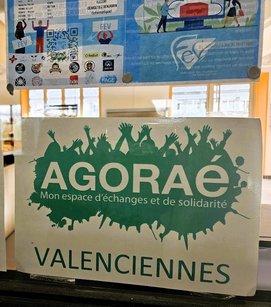
The facility manager gave a tour of the Mont Houy Campus. The intentions were to:
- demonstrate how sustainability initiatives were implemented in the laboratory of the engineering programs,
- demonstrate the contributions and involvement of students in projects that promote sustainability and inclusiveness,
- demonstrate how the campus is attempting to be socially, economically and environmentally responsible, and
- demonstrate the campus efforts in aligning with mandates of SDGs set for HEIs.
The date of the upcoming project meeting was confirmed by the project partners.
Action items were outlined for project members to support the further execution of the project’s planned activities.
A special thanks to the UPHF team for doing an exceptional job at hosting the EFEU team and ensuring the second transnational project meeting was a success.
Rice Cakes and Carbon Neutrality
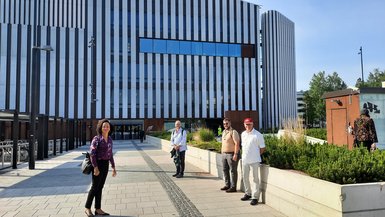
1st Transnational Project Meeting (TPM) – Helsinki, Finland
Finland, known for its delicious Karelian pastries (rice cakes), numerous lakes, saunas, liquorice and midnight sun, was the location of the first transnational project meeting of the Emission Free European Universities (EFEU) Project. The 2-day meeting took place at the Myllypuro Campus of Metropolia University of Applied Sciences in Myllypurontie, Helsinki.
The objectives of the meeting were to:
- address matters related to project management,
- fine-tune the details of the project’s work packages,
- facilitate discussions and conduct presentations on topics forming part of thework packages,
- facilitate team building, and
- determine the best approaches in undertaking the outlined activities of the work packages
Participation was possible both in-person and virtually. Virtual participation was provided to promote inclusivity and greener practices, core principles of the EFEU project. The project members in attendance were: Klaus Homann, Christian Götz, and Abeo Trotter (DHBW); Luis Coehlo, Rui Ruben, and Judite Vieira (IPL); Jorma Säteri, Mehran Attar, and Paula Sajaniemie (Metropolia); as well as El Hadj Dogheche, Dominique Deneux, Hachimi Abba, and Bertrand Bridier (UPHF).
Highlights
Welcome remarks were made by the project leader of the Metropolia University of Applied Sciences, Jorma Säteri, who also perused the planned agenda for the meeting. The discussions and presentations that ensued are documented below.
- Project Management
The team was reminded of their responsibility in time-keeping and documentation management. Draft versions of the Project’s Presentation and LinkedIn Profile were presented, and partners were invited to provide feedback and implement changes as they see fit. - Details of Work Packages
The work packages (WP) were reviewed by the project team. Amendments were suggested and made to the:- Time frame of project’s activities
- Supplementary details for sections relating to the Carbon Footprint Calculator, Transforming Learning Activities, Creation of Modules/Teaching units, and Design of Digital teaching Units
- EFEU Carbon Footprint Calculator (CFC)
- The results of the working groups, focused on the development of CFC for universities in the respective countries of each project partner were reported and documented.
- Current Application of CFCs: A presentation was done by Paula Sajaniemi, a sustainability expert from Metropolia University of Applied Sciences (MUAS), on the methodology used in the carbon footprint calculation for MUAS. Mehran Attar, a master’s student from MUAS, also gave a presentation. The focus of his presentation was the status of currently existing carbon footprint calculators.
- Determining a Common Tool to Calculate the Carbon Footprint of Partner Universities. The following decisions were reached:
- Commuting and procurement data would be included while values related to food and construction were to be excluded.
- The inclusion of other input values would depend on availability.
- The emission coefficient is to be determined later, after the piloting phase.
- The scope of the CFC is to be limited to the campus level and if possible, individual programs.
- Development of Sustainability Awareness Survey
- It was agreed to integrate the sustainability awareness survey and planned mobility studies of project partners.
- Notable examples of sustainability awareness studies were presented.
- Partners were to determine the specific target groups, intended purpose, nature of questions, and type of platform in administering the survey.
One of the planned activities of Work Package 5 is developing the proof of concept for a serious game. The Climate Fresk game, a game that teaches the fundamentals of climate change and its impact, was introduced and explained to the team on-site.
Within the context of the project, participation in the game was very helpful as it provided the experience of administering a serious game, demonstrated its potential as a great teaching tool for partner universities, and proved to be a significant teambuilding exercise
Jorma Sateri provided the team with both a virtual and physical tour of the Metropolia Campus. The objective was to demonstrate the campus‘ efforts in incorporating the sustainable development goals (SDGs). It provided behind-the-scenes access and information on the intricacies of the latest technologies applied in facility management. An explanation was provided on how these technologies contribute to the building’s improved environmental performance and user experience.
The initial results of CFC are to be presented at the DHBW research day (July 2024).
Specific duties were assigned to project partners to support the timely and systematic implementation of activities forming part of Work Package 2.
The EFEU team was satisfied with the results achieved during the first TPM and looks forward to the next phases in the implementation of the project.
A special thanks to the Metropolia team for doing a great job at hosting the EFEU team and successfully organising the first transnational project meeting.

